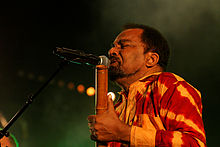Bonga Kuenda
Bonga , better known as Bonga (* 5. September 1942 in Kipiri , Province of Bengo as José Adelino Barceló de Carvalho ) is an Angolan pop singer and songwriter.
Life
Bonga is of Portuguese and African descent; he was born as José Adelino Barceló de Carvalho. He began his singing career at the age of 15. He left Angola at the age of 23 to become an athlete and became the Angolan record holder for the 400-meter course .
Bonga gave up athletics in 1972 and focused on his music. He was immediately known in his country of birth, as well as in Portugal , where he became a star not only for immigrants from the ex-colonies, but also for Portuguese of European and African descent. He produced over 30 albums, sang in Portuguese as well as in traditional Angolan languages. His recordings are a mixture of Portuguese folk sound, semba , kizomba and Latin American elements.
When Angola was still a Portuguese colony, Bonga was a supporter of independence. As a result, he went into exile in the early 1970s. At that time he released his first album, Angola in 1972 .
At that time, the repressive right-wing conservative Salazar regime ruled Portugal . Angolans were discriminated against, in particular their freedom of travel was restricted. In general, they were denied Portuguese citizenship. Bonga's status as a track and field athlete allowed him a certain freedom of movement, which he used to convey messages between exiled freedom fighters and compatriots still in Angola. As the independence struggles intensified, Bonga was forced into exile in Rotterdam , where he made his first record Angola 72 in 1972 and adopted the name Bonga Kuenda. In Angola, a reward was offered for his capture because of the inflammatory rhymes on his album, so that he had to nomadize between Germany, Belgium and France until Angola's independence from Portugal in 1975. During his time in Europe, Bonga met other Portuguese-speaking musicians and also integrated the samba into his already versatile music style.
After independence, the Angolan government gathered the best soloists and founded and supported an orchestra called Semba Tropical . The intention was to revive the destroyed music production, as a ministry spokesman described it during a European tour of the band in the mid-1980s:
“We had great difficulties because of our war of independence. When the Portuguese withdrew, they destroyed basic structures by demolishing and sabotaging equipment, and we had to start from scratch. After independence there were no bands at all. Those who had formed could not play because they had no instruments. "
Discography
- Angola 72 (1972)
- Angola 74 (1974)
- Raízes (1975)
- Angola 76 (1976)
- Racines (1978)
- Kandandu (1980)
- Kualuka Kuetu (1983)
- Marika (1984)
- Sentimento (1985)
- Massemba (1987)
- Reflexão (1988)
- Malembe Malembe (1989)
- Diaka (1990)
- Jingonça (1991)
- Pax Em Angola (1991)
- Gerações (1992)
- Mutamba (1993)
- Tropiclíssimo (1993)
- Traditional Angolan Music (1993)
- Fogo na Kanjica (1994)
- O Homem do Saco (1995)
- Preto e Branco (1996)
- Roça de Jindeno (1997)
- Dendém de Açúcar (1998)
- Falar de Assim (1999)
- Mulemba Xangola (2001)
- Kaxexe (2003)
- Maiorais (2004)
- Bairro (2008)
- Hora Kota (2011)
- Recados de Fora (2016)
Sampler
- Angola (1988)
- Paz em Angola (1991)
- Katendu (1993)
- 20 Sucessos de Ouro (1995)
- Best Of Bonga (2009)
Live recordings
- Swinga Swinga (1996)
- DVD: Bonga ao vivo (2004)
- Bonga Live (2005)
Web links
- Bonga Kuenda at Allmusic (English)
- Bonga on piranha.de
- I am not the noble savage. The daily newspaper from May 24, 2014
| personal data | |
|---|---|
| SURNAME | Kuenda, bonga |
| ALTERNATIVE NAMES | Bonga |
| BRIEF DESCRIPTION | Angolan pop singer and songwriter |
| DATE OF BIRTH | September 5, 1942 |
| PLACE OF BIRTH | Kipiri , Bengo Province |
